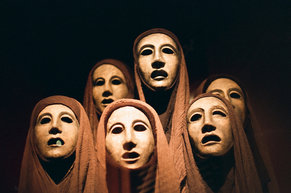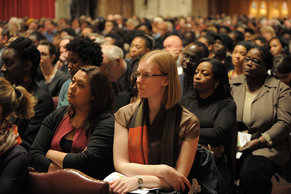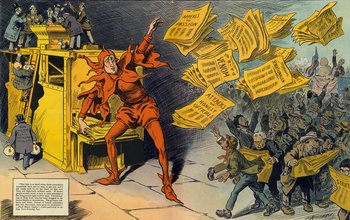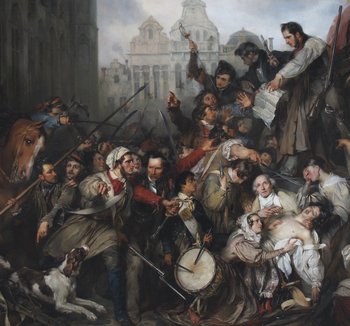
Seattle Windshield Pitting Epidemic
In 1954, a rumor spread in Washington state that a large number of windshields had been damaged with holes, pits and dings. Residents rushed out to check their windshields and discovered previously unnoticed windshield flaws thus feeding the panic. The damage was dramatically attributed to things like nuclear weapons testing. This went so far that the mayor of Seattle asked the President of the United States for emergency assistance.June Bug Epidemic
In 1962, employees at a US textile factory began to report being bitten by June bugs followed by an illness with vague symptoms this escalated after local media reported the event. A total of 62 employees reported the illness. The US Public Health Service investigated and found that many of the workers had not been bitten and the illness did not appear to be authentic such that they labeled it a case of mass hysteria.Hollinwell Incident
A potential case of mass hysteria in Nottinghamshire, England whereby around 300 youths attending a marching band competition fainted with symptoms such as vomiting, sore eyes and dizziness. This may have been related to pesticide use on a nearby field but is often labeled a case of mass hysteria.Dancing Plague of 1518
An outbreak of uncontrolled dancing involving between 50 and 400 people in Strasbourg in present day France. This mostly affected young women. Reports at the time suggested that some members of the group danced until they died. This is disputed. Similar instances of dancing mania are recorded throughout the middle ages beginning in the 7th century.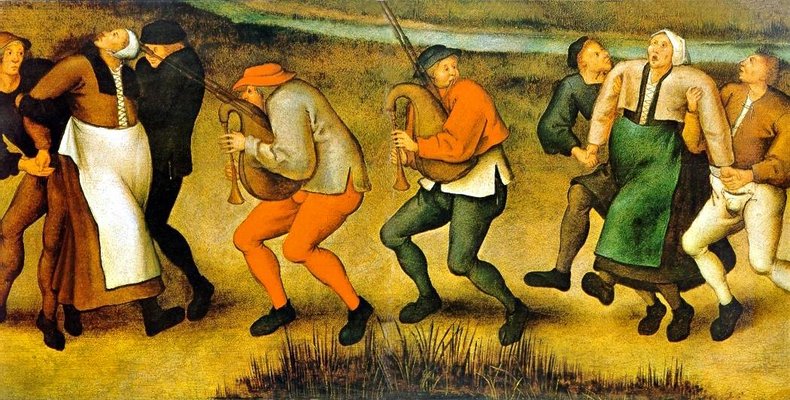
Great Fear
The Great Fear is an event that occurred in France in the summer of 1789 at the start of the French Revolution whereby rumors spread that the aristocracy had plans to starve the peasantry. This caused a large number of spontaneous peasant revolts against Manor Houses across France.Biting Epidemic
According to a German report published in 1784, in the 1400s a nun in Germany began to bite people and this behavior spread as mass hysteria to monasteries throughout Germany, Holland and Italy.Salem Witch Trials
An outbreak of moral panic based on fear of witchcraft in colonial Massachusetts that resulted in 200 being accused and tried. A total of 30 people were found guilty, nineteen of whom were executed including 14 women and 5 men. Another man was pressed to death for refusing to plead.The War of the Worlds
A 1938 broadcast of a radio drama based on H. G. Wells's 1898 novel The War of the Worlds caused a mass panic as listeners took the broadcast literally and word of alien invasion spread by word of mouth. It is estimated the broadcast caused significant levels of fear in about 1.2 million people leading to small disturbances across the entire United States.London Garrotting Panics
A panic in 1856 that reoccurred in 1862–63 based on fear of a sudden jump in garrotting incidents -- street robbery by strangulation. This was caused by inaccurate media reports that suggested that the cessation of transport of convicted felons to Australia had led to a dramatic increase in such attacks. Londoners avoided the streets and began to wear anti-garrotting neck devices.Y2K
Y2K was a widespread computer bug whereby systems on a global basis represented dates with two digits such that they couldn't handle the change of millennium that would occur on January 1st, 2000. Worldwide, organizations raced to fix this bug with the media regularly reporting that the bug may cause disasters and the collapse of the global economic system. It was standard advice at the time to stock supplies in case this should occur. Interest in survivalism grew dramatically in the late 1990s and essentially become a popular phenomenon on a global basis. At the switchover to the new millennium, a few muted problems occurred such as taxi meters in Singapore that stopped functioning. There are two views of the Y2K problem. Some feel it was a severe problem whereby disaster was narrowly avoided. Others believe it was overdramatized due to fear of a new millennium.Eejanaika
In the middle of the 19th century, the American Navy forced Japan to open its markets to the West. This led to sudden and dramatic social, political and economic changes in Japan. Between 1867-68 at the height of this instability a mass hysteria known as eejanaika occurred whereby spontaneous dancing, parties, bizarre rituals, recklessness, lawlessness and carnivalesque behavior filled the streets of Japan's great cities. Eejanaika can be roughly translated "why not?" and indicates that people felt that everything was ending such that one last party was appropriate.Tulip Mania
It is common for financial speculation driven by a fear of missing out to resemble mass hysteria. For example, a bizarre episode in the Dutch Golden Age whereby investors began to aggressively buy tulip bulbs. Holland had the highest per capita income in the world at the time but the price for a single bulb reached 10 times the annual income of a skilled artisan. When this collapsed in February 1637 it triggered a serious economic contraction.Halloween Candy Tampering
A October 28, 1970 article published in The New York Times that speculated about the possibility of candy tampering on Halloween lead to a large number of urban myths and a dramatic change in Halloween customs. This is viewed as a moral panic that was disconnected from reality.Notes
There are hundreds of well documented cases of mass hysteria such that the examples above are non-exhaustive.| Overview: Mass Hysteria | ||
Type | ||
Definition | Irrational behavior of a large group sparked by a fear that is unjustified. | |
Related Concepts | ||

